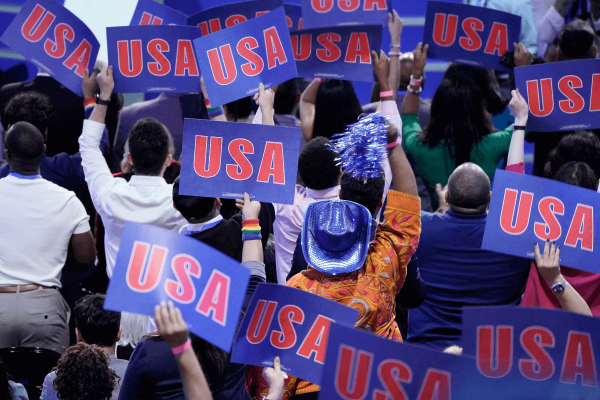This summer I’ve noticed a surge in patriotic signaling and sentiment. Both the Republican and Democratic national conventions plastered stars and stripes everywhere as speakers from both parties offered superlatives about the United States — The greatest country! The most powerful country! The richest country! — while delegates chanted “USA! USA! USA!”
I noticed some of this patriotic spirit in myself during this summer’s Olympic games. Despite the International Olympic Committee’s many corruption scandals, I still felt the undeniable magic when the best athletes from all over the world compete — and an irrepressible pride when an U.S. athlete or team does well.
Christian engagement in American patriotism has often gotten a bad rap, and rightly so: All too often, a healthy love for one’s country (patriotism) seeps into a pernicious love of blood and soil (nationalism), with the latter often marked by a sense of superiority, domination, or ethnocentrism. But instead of offering a strong counter-witness to these toxic impulses, Christians in the U.S. have often led the way, twisting the gospel to support American nationalism. Understandably, some Christians — both now and in the past — have responded by rejecting nationalistic forms of patriotism as something incompatible with following Jesus.
As a Christian, I believe the answer isn’t to altogether reject patriotism, but instead to redeem it. Instead of a patriotism rooted in ethno-nationalism or an imagined version of the America of days gone by, I want to live out a love for my country that refuses to demonize my opponents, rejects an us-versus-them politics, and continually commits to the project of realizing the core ideals that make us a great nation: achieving true liberty and justice for all. I yearn for a real contest of ideas, plans, and visions for how we can make the promise and creed of the U.S. real and accessible for everyone — a promise we’ve never fulfilled, but which I believe is still possible. As I argue in A More Perfect Union, “a patriotism that is blind and ahistorical poisons us all and, at worst, reasserts the lie that some Americans are the ‘true Americans’ and that some Americans are worth more than others.”
In his first-ever editorial in 1971, former president and Sojourners founder Jim Wallis wrote about the grave dangers of nationalism to the witness of the church in the U.S.:
“The American captivity of the church has resulted in the disastrous equation of the American way of life with the Christian way of life. This cultural captivity has caused the church to lose its prophetic voice by preaching and exporting a pro-American gospel and a materialistic faith which supports and sanctifies the values of American society, rather than calling them into question. By its implication in the American status quo, by participating in the anti-Christian mindset of our society (racism, materialism, nationalism), the church has lost its ethical authority…”
These words ring no less true in 2024 than they did in 1971. At the Republican National Convention, we saw an ethno-nationalist vision of this nation’s past and a desire for renewed U.S. dominance all wedded to a sense of divine mandate. Multiple speakers implied not only that God protected former President Trump from a would-be assassin’s bullet on July 13, but that, as Trump himself put it, he had “God on [his] side.” Dr. Ben Carson quoted the text from Romans to tell the audience: “When God is with us, nobody can stand against us,” which suggests a belief that God has special favor for the United States and/or the Republican party specifically: textbook Christian nationalism.
This heretical distortion of our faith needs to be met with unwavering opposition from all those who understand that loyalty to God must always come first. A Christianity that truly puts God first must never wrap the cross in the flag; instead, we must embrace our constitutional commitment to religious freedom, which has so often enabled religion and religious liberty to both flourish in our nation.
But this isn’t just a Republican problem. At the Democratic National Convention in Chicago, Vice President Kamala Harris used her acceptance speech to redefine her love of the U.S. through the lens of expanding and protecting our most cherished freedoms, including freedom from gun violence, freedom from climate crisis, and the freedom to vote; I found this refreshing. Yet when Harris promised to “ensure America always has the strongest, most lethal fighting force in the world” — to raucous cheers from Democratic delegates — I couldn’t help but think how similar language from former presidents like Lyndon Johnson and Richard Nixon, in the context of the Vietnam War, prompted Jim to write against “the American captivity of the church.” Both in 1971 and today, the U.S. military industrial complex and its bloated budget crowds out funding for programs of social uplift and imposes American military might on the rest of the world.
As individuals and the collective church, we are called to put our obedience to God and our belief in the liberating teachings and life of Jesus Christ ahead of any earthly loyalty. This means that we shape our political convictions based on our understanding of the best way to follow the moral convictions and teachings of our faith, not the other way around. We must avoid all manifestations of the belief — woven into our country’s DNA from the very beginning — that the United States of America is, on some level, a chosen nation or an innocent nation. This includes rejecting overt expressions of God’s unique favor for this country as well as subtler ways we accept that this nation’s prosperity is often made possible by the maintenance of a profoundly unjust status quo both at home and around the world.
But I also reject understandings of Christianity that say we shouldn’t love any nation, including our own. While John 3:16 makes it crystal clear that God’s love is for the entire world, expressing a love for our own country can be both healthy and important. For instance, I love America’s incredible racial and ethnic diversity, which I believe is a superpower, not a weakness or something to be feared. I love the sheer breadth and beauty of our nation’s landscape, our ingenuity and entrepreneurial spirit, our music and art, and so much more. Most of all, I love the United States’ ideals — the notion that we’re all created equal and are “endowed by [our] Creator with certain unalienable Rights, [and] among these are Life, Liberty, and the Pursuit of Happiness.” Loving these ideals means working tirelessly to make them a reality for everyone. Ultimately, I want our patriotism to always be rooted in a love that seeks to “overcome evil with good” (Romans 12:21).
In Notes of a Native Son, James Baldwin wrote, “I love America more than any other country in the world and, exactly for this reason, I insist on the right to criticize her perpetually.” In that same spirit, I show my love for this country — yes, my patriotism — by celebrating its successes and, in a spirit of tough love, offering critiques when we fall short of our cherished ideals. As a Christian, loving my country also means that I care enough about the place I call my home to invest real time and effort to make it more worthy of genuine pride, always knowing that love for the U.S. must come alongside a genuine love for the world.
This election season, I want Christians to reject the way patriotism has so often been framed through the false lens of Christian nationalism. Instead, I hope we can embrace a love for our country that drives us to seek to build a radically inclusive Beloved Community where everyone can thrive, where punishment and privilege aren’t tied to race, gender, sexual orientation, religion, ableness, or any other type of human difference that’s been used to discriminate or divide. No political party — or religious group — should have a monopoly on patriotism. Instead of arguing over who loves our nation more, I want to see our politics become a contest of visions, ideas, and concrete plans around how we can more quickly and completely make the ideal of liberty and justice for all become a reality for all.
Got something to say about what you're reading? We value your feedback!







